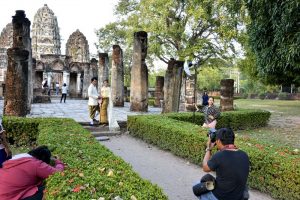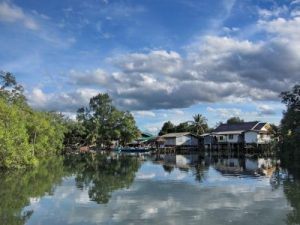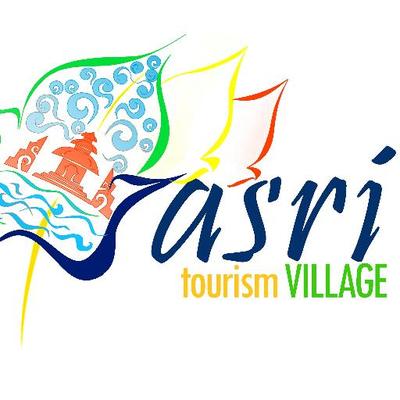What is Sustainable Tourism?
There are many terms that float around that may sound similar but actually refer to something distinct.
Definition of Sustainable Tourism

Negative impacts to a destination include economic leakage, damage to the natural environment and overcrowding to name a few.
Positive impacts to a destination include job creation, cultural heritage preservation and interpretation, wildlife preservation landscape restoration, and more.
Sustainable tourism is defined by the UN Environment Program and UN World Tourism Organization as « tourism that takes full account of its current and future economic, social and environmental impacts, addressing the needs of visitors, the industry, the environment and host communities. »
Additionally, they say that sustainable tourism « refers to the environmental, economic, and socio-cultural aspects of tourism development, and a suitable balance must be established between these three dimensions to guarantee its long-term sustainability” (UNEP & UNWTO, 2005: 11-12. Making Tourism More Sustainable – A Guide for Policy Makers).
Learn about the difference between Regenerative Tourism and Sustainable Tourism here.
Definition of Ecotourism

Fennell described it as such: « Ecotourism is a sustainable form of natural resource-based tourism that focuses primarily on experiencing and learning about nature, and which is ethically managed to be low-impact, non-consumptive, and locally-oriented. It typically occurs in natural areas, and should contribute to the conservation or preservation of such areas » (Fennell, 1999: 43. Ecotourism: An Introduction).
The Mohonk Agreement (2000), a proposal for international certification of Sustainable Tourism and Ecotourism, saw ecotourism as « sustainable tourism with a natural area focus, which benefits the environment and communities visited, and fosters environmental and cultural understanding, appreciation, and awareness. »
The ecotourism definition by the Global Ecotourism Network (GEN): « Ecotourism is responsible travel to natural areas that conserves the environment, sustains the well-being of the local people, and creates knowledge and understanding through interpretation and education of all involved (visitors, staff and the visited). »
Definitions of Responsible Travel
Responsible Travel refers to the behavior of individual travelers aspiring to make choices according to sustainable tourism practices. The behaviors usually align with minimizing the negative impacts and maximizing positive ones when one visits a tourism destination.
Travelers that want to learn more about how to be a responsible traveler can visit the section on the GSTC website For Travelers.
Summary of the difference between Sustainable Tourism, Ecotourism, and Responsible Travel
Ecotourism is a niche segment of tourism in natural areas.
Sustainable Tourism does not refer to a specific type of tourism, rather it is an aspiration for the impacts of all forms of tourism to be sustainable for generations to come.
Responsible Travel is a term referring to the behavior and style of individual travelers. The behaviors align with making a positive impact to the destination rather than negative ones.
Sustainable Tourism and the GSTC Criteria

They are the result of a worldwide effort to develop a common language about sustainability in tourism. They are categorized in four pillars: (A) Sustainable management; (B) Socioeconomic impacts; (C) Cultural impacts; (D) Environmental impacts.
These standards were built on decades of prior work from industry experts around the globe. During the process of development, they were widely consulted in both developed and developing countries. They reflect our goal in attaining a global consensus on sustainable tourism.
The process of developing the Criteria was designed to adhere to the standards-setting code of the ISEAL Alliance. The ISEAL Alliance is the international body providing guidance for the management of sustainability standards in all sectors. That code is informed by relevant ISO standards.
Finally, the GSTC Criteria are the starting goals that businesses, governments, and destinations should achieve. Tourism destinations each have their own culture, environment, customs, and laws. Therefore, the Criteria are designed to be adapted to local conditions and supplemented by additional criteria for the specific location and activity.
There are three sets of Criteria
- GSTC Industry Criteria = relates to the sustainable management of private sector travel industry, focusing currently on Hotels and Tour Operators.
- GSTC Destination Criteria = relates to sustainable management of Tourism Destinations.
- GSTC MICE Criteria = relates to sustainable management of Venues, Event Organizers and Events & Exhibitions.
Learn more about Sustainable Tourism
Reading one article is not enough. The GSTC website offers those interested in learning more about sustainable tourism the needed resources. Make sure you visit the relevant pages for you:
- For Hotels & Accommodations
- For Tour Operators
- For Governments & Destinations
- For Corporate and Business Travel
You can also join one of the regular GSTC courses:
- Want to gain in-depth knowledge of the GSTC Criteria and understand sustainable tourism? The GSTC Sustainable Tourism course is for you.
- Are you a hotelier or work in the hospitality sector? GSTC Sustainable Hotel course
GSTC Sustainable Tourism Training Schedule
✓ Gain in-depth knowledge of the GSTC Criteria, the global standard for sustainability in travel and tourism.
✓ Make informed decisions on how to implement sustainability practices for your company or destination.
✓ Get ready for developing viable and actionable sustainable tourism policies and practices for your organization
| Dates | Course ID | Location / Format | Trainer(s) | Live Session Time | Language | Price | Register |
|---|---|---|---|---|---|---|---|
| 23 de Abril – 23 de Mayo, 2025 | ST-2504-ES | Online | Jorge Moller, Natalia Naranjo | 17:00 a 18:30 hrs Madrid (CEST, UTC+2) | Spanish | Starting at USD 200 | |
| Apr 24 – May 23, 2025 | ST-2504-EN | Online | Nia Klatte, Ayako Ezaki | 19:00 CEST (UTC+2) / 13:00 New York | English | Starting at USD 395 | |
| Apr 28 – May 30, 2025 | ST-2504-Polish | Online | Anula Galewska | TBD | Polish | Starting at 1,400PLN | |
| May 22 – Jun 20, 2025 | ST-2505-EN | Online | David Ermen, Ayako Ezaki | 9:00 CEST (UTC+2) / 15:00 China | English | Starting at USD 395 | |
| Jun 26 – Jul 25, 2025 | ST-2506-EN | Online | Nia Klatte, Ayako Ezaki | 19:00 CEST (UTC+2) / 13:00 New York | English | Starting at USD 395 | |
| Sept 4 – Oct 3, 2025 | ST-2509-EN | Online | TBC | 9:00 CEST (UTC+2) / 15:00 China | English | Starting at USD 395 | |
| Oct 9 – Nov 7, 2025 | ST-2510-EN | Online | TBC | 19:00 CEST (UTC+2) & 19:00 CET (UTC+1) / 13:00 New York | English | Starting at USD 395 | |
| Nov 13 – Dec 12, 2025 | ST-2511-EN | Online | TBC | 9:00 CET (UTC+1) / 16:00 China | English | Starting at USD 395 |
I’ve participated in the course to get a comprehensive overview of destination sustainability criteria. Much more than this, the course gave me the up-to-date analysis of current trends, and a huge number of relevant cases from the destinations, the industry networks and the service providers. I strongly recommend to attend the course.
My course facilitator and teacher (Ayako and Antje) went above and beyond to answer our questions and provide us with additional resources. The course content (the GSTC Criteria) was delivered in an understandable and organized way. Learning the GSTC Criteria and how it applies to our own projects, businesses, and destinations is integral to anyone wanting to do any kind of work in the future centered around travel. I appreciated that the course was delivered in an interactive way over Zoom, and not just something we watched on YouTube. For me, being able to interact with fellow students from around the world, was a big plus. Was well worth it, and I highly recommend the course!
This course has been very relevant and provides in-depth knowledge of GSTC criteria for sustainable practices for destinations as well as the travel industry [with] plenty of real life examples and share links to plenty of reading material throughout the course. … As we move forward during these difficult COVID times, learning our lessons on the damage to nature, it becomes all the more important for industry professionals to get trained and step up efforts to embrace sustainability in all aspects of tourism. Hence, I recommend this course to all industry professionals.
This course enables participants to connect with the GSTC team directly, over an easy to use platform and network around the world. Using real life examples and detail in each of the 4 sections of the GSTC.
The GSTC training was a great way to connect, network, and engage in mind-broadening and eye-opening discussions with others in the diverse field of sustainable tourism. I would highly recommend this as a starting point for anyone interested in the journey of regenerative and sustainable tourism.
The course was great and the on- the-go discussions added great value to keep abreast of trends from across the globe. Participants from various parts of the world brought in their experiences and made the course very interesting.
Hearing about actual destinations applying Sustainable Tourism initiatives and learning from real situations practicing Sustainable Tourism, as well as the related successes and challenges, was very informative and valuable. My favorite part was the unexpected camaraderie from and connections with the other participants. I genuinely enjoyed the online discussion, sharing of ideas, and breakout groups and, overall, meeting so many others who she a passion for Sustainable Tourism. Thank you, GSTC, for a great course!
A complete holistic approach to sustainable tourism. The comprehensive lessons given each week break down the GSTC Criteria and are paired with practical examples, international experts and ‘hands on’ online workshops. The opportunity to discuss and share insights from all the participants around the world not only contributes to my own knowledge but to also my professional network. I highly recommend this course for anyone discovering sustainable tourism.
The course is quick and handy way to immerse in the issues of Sustainability in Tourism and a great kick start in starting your own business or destination program. I could have had the course even longer and especially the live sessions were great to get to know some of the other participants and share their knowledge and experiences – best practices are the best way to get started and to get valuable information. Highly recommended!
The course was so informative and presented in an engaging & interesting way. The examples & speakers gave us a lot to think about and many tangible ways that we can make a difference in our travel business. Thank you!
This course has given me an approach to the GSTC Criteria, where the basic and complete structure to move forward on sustainable paths is visualized. The reflections generated through real examples, discussions and available material are key to better internalize what sustainability means. Ideas applicable to our business and our work area appear during the course that contribute positively to one’s reality. I will recommend this course, for its contribution to the objective, honest and constructive understanding of what sustainability is.
I can only highly recommend the course for every travel and tourism professional- it is a great motivational boost to get into action and helps me support destinations in bringing the idea of destination stewardship – an inclusive and holistic approach – alive. We do not need more and more tourists, we need sustainable tourism.
Taking the GSTC training at this point in time was extremely valuable. It gave me a sustainable tourism framework to help assess what I’ve been able to accomplish and also consider the role that sustainable experiential travel may mean as we begin to inch our way out of the world of zero tourism towards something likely new and different. One other great benefit of the training was starting to get acquainted and sharing with other participants and instructors from around the globe. These connections will be valuable for a very long time to come.
I found this online course well structured and enjoyable. The trainers are really inspiring, extremely knowledgeable about the field and very supportive. The live online sessions give a great introduction to key topics, and there are online lessons, discussion forums and reference material to deepen knowledge. I feel like I have access to so much wisdom, and it is great to be part of a global community of sustainable tourism practitioners.
Thank you GSTC for such a great course. The content was relevant, the case studies were inspiring and the course structure was spot on! I can’t wait to take my learnings and inspiration and activate it across regional destinations in Australia. Keep up the great work.
What I liked the most about this course is the well-defined structure, the opinion sharing with online classmates, and the up-to-date topics. It makes the experience much more effective and enjoyable.
Excellent course that sets the foundations for sustainable tourism practice.I was very new with sustainable tourism and now after the course I have very solid understanding and skills to apply to my job. In addition, the amazing network of professionals sharing ideas is another great tool!
This course provided me with a thorough understanding of how to implement sustainable travel practices. I will definitely integrate information from this training into my work with travel organizations and destinations to help them achieve short-term progress through a long-term strategy.
The GSTC training provides a comprehensive overview of key indicators for a holistic view of sustainable tourism. The training provided an excellent opportunity to network with other tourism professionals, and to share ideas, develop plans, and comment on sustainable tourism initiatives that are being implemented in a diverse array of locations globally. I’m grateful for the connections that I made and for the helpful feedback on ideas for improving sustainability in several operations.
Useful and inspiring! The way the course is organised with lots of practical experience from colleagues in the tourism sector is indeed the most useful and interesting part of the course, [making it easier] to approach the GSTC criteria.
The GSTC course was really great to me because it gave me an in-depth knowledge about sustainable tourism. The combination of the criteria explanation and the presentation from other experts was really great, as it gave us the know-how, lots of samples and case studies. Before joining this course, I had heard about the term sustainable tourism many times, but [was not sure] what it is all about and how we can achieve it. I am glad to have gained the bigger picture of sustainable tourism. I’m developing my village to be a community based tourism destination, and now I can adopt and apply the standard locally.
A great training program that gives the participants a thorough understanding on the sustainable management of both destinations and individual businesses. Anyone from the industry – from the business or the government side – should understand the bigger picture of the destination level management as well as the industrial level so that both public and private sectors can work together for a more sustainable tourism industry.
The GSTC Sustainable Tourism Training Program provided an up-to-date perspective and holistic approach on the topic. I really enjoyed taking part in the group discussions and hearing about the realities of other destinations and their challenges.
I think the training was very useful and gave me many insights that I will use in my daily work to develop more sustainable tourism. The training class was also a good group for networking.
The Global Sustainable Tourism Council (GSTC) is the most widely recognized institution for offering sustainability courses for tourism professionals.
This is a one-of-a-kind course that provides the tools in getting you started. Not to mention, you’re also collaborating with people and organizations across the globe facing similar challenges. The feedback from fellow students was invaluable and honestly, what better way to tackle some big challenges related to the environment than with people from different countries and backgrounds. I’d take this course again just for those connections!
The [GSTC course] has been a remarkable learning experience and a great introduction to sustainable tourism. The combination of online resources, discussion forums, weekly live events with guest presenters provides a deeper understanding and useful tools in sustainable tourism. The trainers have incredible expertise in both tourism and sustainability and share their knowledge and passion about current sustainability practices. I would highly recommend this course to everyone involved in the tourism industry or have a interest in sustainable tourism.
An excellent programme run by well qualified professional staff and trainers. The guest speakers were world class and materials industry leading. A definite must for any tourism professional who is serious about making sustainable impacts for the betterment of our industry.
Amazing learning experience. Exceeded my expectations by far. Excellently organized and facilitated. Great dynamics in discussions with course participants – so much to learn from. Highly valuable best practices and interactive modules really made the best learning experience I had until now! It really motivated and inspired me to continue on the road of global sustainable tourism.
The GSTC Sustainable Tourism Training gave me the tools and network to be able to work for a more sustainable tourism sector in the area where I’m based (South Sweden). The structure with the four principles makes it easy to follow and to discuss also outside the GSTC world. The examples from the other participants were great, and we will continue sharing good and bad examples from destinations all over the world.
To work on sustainability is a never-ending story and can be overwhelming at times. The GSTC training supports a structured approach toward continuous improvement. It provides applicable tools to evaluate our sustainability performance and guidance for setting long-term strategies. It allows you to break down this massive task into achievable working packages.
The GSTC training was a great first touch point for me into the world of sustainable tourism and destination management. I loved hearing case studies from around the world and real life examples on how the GSTC criteria can make a difference. The course has enabled me to start building on these criteria within my job.
The training has enable me to go through all the GSTC Criteria thoroughly with better knowledge of sustainable tourism standard and practices. It will be useful as basic guidelines for the Foundation to use these Criteria, as the destination wants to embark in becoming a sustainable tourism destination, aiming to become GSTC-Certified.
I would definitely recommend GSTC training to absolutely everyone in the tourism industry. The entire [GSTC] framework is extremely useful and important – a framework of values and ideas that is evolving, and that is meant for us a roadmap to make things better for people and companies that may be starting from different points in the journey towards sustainability.
The quality of this training was really first class; materials, presentations, trainer support, resources and discussions. The forum helped keep everything relevant and up to date, and I also liked the format of the live events. All guest presenters were excellent; I liked that they were sharing real life experiences and not just theoretical examples. From each and every live presentation I gained ideas, reinforcements to my own experiences and enthusiasm for what I and my colleagues are doing in our own part of the world.
The STTP programme has been a good introduction to the principles of sustainable tourism. It was a good mix of presentations and cases of sustainable tourism in real-life, insights from experts from various countries and across tourism sectors and explanation of key GSTC criteria. Participants were encouraged to share their experiences and observations through discussion forums and presentations, which made the sessions more lively. The final exam is recommended for those who wish to test their ability to put these principles to practice. I highly recommend this course to tourism industry professionals wishing to incorporate sustainable tourism management at work.
The GSTC training provided me with a deep understanding of the criteria. My fellow classmates were industry experts in various sectors from around the world, bringing the criteria to life with valuable examples/discussions of how they have implemented the very practices we were learning.
My first impression was the organization, it was perfect regarding the admin efforts and the learning tools. The course materials were really useful, as well as the live sessions from which I gained a deep understanding and experience from the other participants. I really want to have the chance to thank all the team who was involved, and of course I would recommend people working in the tourism industry to join this course
The training gave me a clear understanding of the challenges we face and the actions to take to make sustainability effective, [covering] each of the main areas in a systematic way with enough technical detail for those who needed it, without losing the less technical trainees (like myself) who needed to understand the broad overview of sustainable tourism practices
The overview of standards, coupled with best practice and real world examples has been very beneficial for my work in destination management and responsible tourism development. The ability to meet likeminded industry colleagues, who are working in this arena was also highly valuable.












































